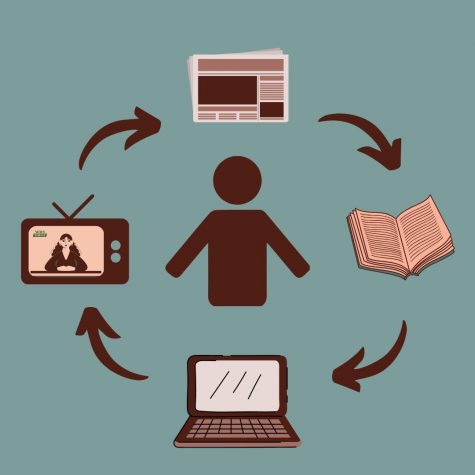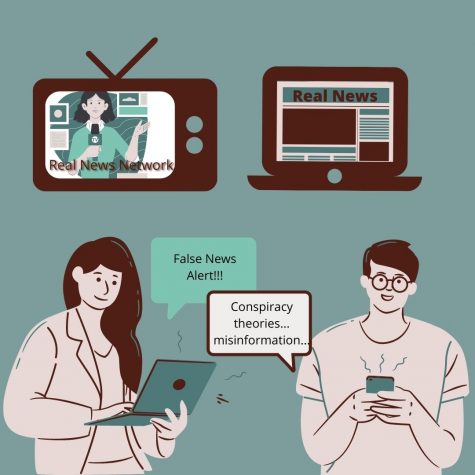Why journalism matters: credible news is a newly endangered species
February 12, 2021
In the 21st century, a huge majority of the population consumes some form of media everyday, whether that be television news, social media, or online news sites. The information that we see comes from everywhere, including the journalism industry.
Journalism is constantly evolving to provide information consumed by media outlets.

“Anybody with a cellphone can be a journalist”
While historically, people had to wait until evening for their daily 2-hour broadcast, nowadays consumers get instant headlines flashing on their screens. We are constantly in-the-know, with cell phones, TVs, radios, computers, and endless technology. Not only can everyone read the news, but anyone can share their opinion.
“Even though newspapers are dying out fast, social media exists. There’s still television and radio, there’s YouTube. There’s so many different outlets out there and that’s great because it gives anybody the option or the ability to get news out there,” said Cam Inman, Sports Reporter for the Bay Area News Group.
With so many media outlets there’s a seemingly infinite amount of information that people have at their disposal.
The dangers of misinformation
With such a variety of forms of communication, it allows people the opportunity to share information (news, events) with the world. Anyone can be a journalist, but being truthful and factual is an enormous factor to bring proper news to the masses.
“The internet: it can go anywhere, be anywhere. it’s not about just watching the newcast at a certain time, the news is at your fingertips at any time. Anyone can publish; you can be a blogger and you can publish whatever you want. So it’s created a lot more voices, but the ability to understand and verify is the biggest challenge, because there are some people who won’t verify what they are reading, or read from a trusted news source,” said Tracey Watkowski-Silva, Vice President of News, KGO-TV ABC7 News.
During former President Donald Trump’s presidency, the journalism industry was heavily criticized, getting called “fake news” and losing its credibility. While fake news does exist, it does not come from major news sources. In reality, fake news comes from conspiracy theory Facebook posts, misinformed tweets, and biased blogs.
Anyone can claim that their information is reliable, but true journalists cite credible sources and inform without bias.

“With President Trump when he didn’t like something that the media was reporting he would call the industry fake news … What’s happened here, locally, is that people out on the street hear that, they’re seeing that the president is calling journalists and the media “fake news” and then our people go out covering a story and all of a sudden they’re getting called fake news as they’re trying to cover a story that’s not even political. It may be something unrelated and they’re being attacked as a part of fake news,” said Watkowski-Silva.
Most authentic journalists can agree that the whole concept of “fake news” has caused problems for those in their industry.
Consumers decide whether or not they approve of the information they’re receiving, and when they don’t like it, they simply don’t believe it.
“For journalists it really outrages us — those of us in the profession that strive to be accurate and fair and balanced. There is fake news out there, but it’s the interpretation of where you’re going for your news source. There’s fake news outlets, but when there’s credible mainstream outlets and people want to say that they’re not telling the truth, what exactly are they seeing? Are they writing an opinion piece where people are just giving their opinion or is there misinformation out there?” said Inman.
Why do people call it “fake news”?
People tend to call news outlets and stories “fake news” when they disagree with what they’re consuming.
But fake news is information that is not credible, researched, or factual. This is the disadvantage of an overwhelming amount of media outlets that allow anyone to post, tweet, or share.

“As a journalist, your job is to be a messenger of truth that’s going on to feed [people] information, that’s accurate and reliable that can be credible and depended upon. In today’s society where anybody with a cellphone can be a journalist, whether you’re on Twitter or YouTube or Instagram or you have your own blog, journalism is more important today than ever to be able to have people that are credible to check to make sure the information out there is accurate, and so that people can form their own opinions off of accurate news,” said Inman.
Even though the internet may be plagued by fake news from unreliable sources and claims of fake news from sources that are credible, journalism is ever-adapting and will continue to grow with the people it informs.
“There’s always going to be a need for storytelling, for news gathering, for people wanting to read content, there’s all sorts of different aspects of it. There’s always an evolution of how we can get communication differently. There’s always going to be something, and the beauty of it is we don’t know what’s next, it’s always evolving,” said Inman.





